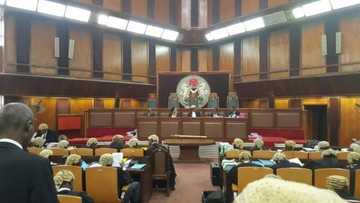Ex-Pakistan leader Pervez Musharraf sentenced to death
- Pakistan's former military leader has been sentenced to death at a special court hearing
- A three-member court sentenced him over a high treason charge that has been pending since 2013
- He seized power in a military coup in 1999 and served as the president from 2001 to 2008
- The ex-president is currently in Dubai where he has been receiving treatment since 2016.
- His charge relates to his suspension of the constitution in 2007 when he imposed emergency rule to extend his tenure
Pakistan's anti-terrorism court has sentenced former president and military dictator Pervez Musharraf to death after being found guilty of high treason and subverting the constitution.
Pervez had been charged with imposing a state of emergency in the country in 2007, suspending the constitution and detaining politicians and judges as his grip on power began to slip.
The ex-president, currently living in Dubai after he was allowed to leave the country for medical treatment in 2016, was found guilty on Tuesday, December 17, in his absence, BBC reports.
The ruling was made despite his attempts to halt the proceedings while insisting he was innocent
In a video statement issued from a hospital bed in November 2019, the 76-year-old leader, who was described as a dictator, said the case was baseless.
Pervez, who had denied the charges, had asked the high court in Lahore to put a stop to the proceedings until he was healthy enough to appear.
The court's full ruling was not available but it said in a summary it had analysed complaints, records, arguments and facts in the case and had reached a majority verdict.
The leader, who seized power in a military coup in 1999 and served as the country's president from 2001 to 2008, is the first military ruler to ever stand trial in Pakistan.
He was forced to resign under the threat of impeachment after a political party that backed him fared poorly in a general election, and he has spent much of the time since then abroad.
The high treason case was brought against him by ex-prime minister Nawaz Sharif and began in 2014.
His indictment was a highly significant moment in a country where the military has held sway for much of its independent history.
Under the emergency, all civil liberties, human rights and democratic processes were suspended, from November 2007 to February 2008.
The final years of his rule were marked by struggles with the judiciary stemming from his wish to remain head of the army while also being president.
Many of Pakistan's army chiefs have either ruled the country directly after coups, as Gen Musharraf did, or wielded significant influence over policymaking during periods of civilian rule.
NAIJ.com (naija.ng) -> Legit.ng. We have upgraded to serve you better
Bobi Wine: Ugandan activist speaks on Sowore’s incarceration | Legit TV
Source: Legit.ng




